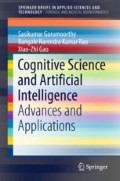Abstract
Web personalization is a method of modifying a web site to the requirements of exact users gaining benefit of information attained for the study of the user’s directional conduct in association with other material composed in the web framework. In this education primarily we give request to distinctive search engine what’s more, the top n list from each web search tool is picked for all the ore dealing with our technique to fulfill data location period. Finding Large Itemsets: create all blends of things that have a bolster an incentive over a client characterized least support. The support for an itemset is the quantity of exchanges that contain the itemset. These things are called substantial itemsets. We then union the top n list in view of one of a kind connections and we do some parameter computations, for example, title based figuring, piece based estimation, content based count, address based computation, interface based estimation, URL based count and co-event based count. We give the arrangements of the counts with the client given the positioning of connections to the fluffy bat to prepare the framework. The framework then positions and unions the connections we get from various web indexes for the question we give. In this paper the reaction time in view of main fifty connections and hundred connections of our system is better contrasted with the current fluffy strategy and the exactness of our method is high contrasted with the current procedure for the distinctive questions we gave. The computed esteems with the client positioned rundown are given to the fluffy bat to rank the rundown. The calculated values with the user ranked list are given to the fuzzy-bat to rank the list.
Access this chapter
Tax calculation will be finalised at checkout
Purchases are for personal use only
References
Araus, et al. 2001. Searching the Web. ACM Transactions on Internet Technology 1: 243.
Tang, Juan, Ya-Jun Du, and Ke-Liang Wang. 2007. Design and implement of personalize meta-search engine based on FCA. In Proceedings of the Sixth International Conference on Machine Learning and Cybernetics, Hong Kong, 19–22 August 2007.
Abawajy, J.H., and M.J. Hu. 2005. A new internet meta-search engine and implementation. In The 3rd ACS/IEEE International Conference on Computer Systems and Applications.
Satya Sai Prakash, K., and S.V. Raghavan. 2001. DLAPANGSE: Distributed Intelligent Agent based Parallel Architecture for Next Generation Search Engines. Department of Computer Science & Engineering, Indian Institute of Technology Madras, India.
Aslam, J.A., and M.H. Montague. 2001. Metasearch consistency. In Proceedings of the ACM International Conference on Research and Development in Information Retrieval (SIGIR), 386–387.
Dwork, C., R. Kumar, and M. Naor, D. Sivakumar. 2001. Rank aggregation methods for the web. In Proceedings of the ACM International Conference on World Wide Web (WWW), 613–622.
Lamberti, Fabrizio, Andrea Sanna, and Claudio Demartini. 2009. A relation-based page rank algorithm for semantic web search engines. IEEE Transactions on Knowledge and Data Engineering 21(1).
Telang, Aditya, Chengkai Li, and Sharma Chakravarthy. 2012. One size does not fit all: to-ward user- and query-dependent ranking for web databases. IEEE Transactions on Knowledge and Data Engineering 24 (9): 1671–1685.
Meng, W., C. Yu, and K.-L. Liu. 2002. Building efficient and effective metasearch engines. ACM Computing Surveys 34 (1): 48–89.
Spink, A., B.J. Jansen, C. Blakely, and S. Koshman. 2006. Overlap among major Web search engines. In Proceedings of the IEEE International Conference on Information Technology: New Generations (ITNG), pp. 370–374.
Vogt, C.C. 1999. Adaptive Combination of Evidence for Information Retrieval. Ph.D. thesis. University of California at San Diego.
Akritidis, Leonidas, Dimitrios Katsaros, and Panayiotis Bozanis. 2011. Effective rank aggregation for metasearching. The Journal of Systems and Software 84: 130–143.
Ishii, Hideaki, Roberto Tempo, and Er-Wei Bai. 2012. A web aggregation approach for distributed randomized pagerank algorithms. IEEE Transactions ON Automatic Control 57 (11): 2703–2717.
Durao, Frederico, and Peter Dolog. 2012. A Personalized Tag-Based Recommendation in Social Web Systems.
Zhou, Zhurong, and Dengwu Yang. 2014. Personalized recommendation of preferred paths based on web log. Journal of Software 9 (3): 684–688.
Rizvi, N.T.S.H., and Ranjit R. Keole. 2015, January. A preliminary review of web-page recommendation in information retrieval using domain knowledge and web usage mining. International Journal of Advance Research in Computer Science and Management Studies 3(1).
Yang, Linjun, and Alan Hanjalic. 2012. Prototype-based image search reranking. IEEE Transactions On Multimedia 14(3): 871–872.
Abrishami, Soheila, Mahmoud Naghibzadeh, and Mehrdad Jalali. 2012. Web page recommendation based on semantic web usage mining, vol. 7710 of the series Lecture Notes in Computer Science, pp. 393–405.
Author information
Authors and Affiliations
Corresponding author
Rights and permissions
Copyright information
© 2018 The Author(s)
About this chapter
Cite this chapter
Srinivasa Rao, P., Vasumathi, D., Suresh, K. (2018). The Adaptive Strategies Improving Web Personalization Using the Tree Seed Algorithm (TSA). In: Cognitive Science and Artificial Intelligence. SpringerBriefs in Applied Sciences and Technology(). Springer, Singapore. https://doi.org/10.1007/978-981-10-6698-6_3
Download citation
DOI: https://doi.org/10.1007/978-981-10-6698-6_3
Published:
Publisher Name: Springer, Singapore
Print ISBN: 978-981-10-6697-9
Online ISBN: 978-981-10-6698-6
eBook Packages: EngineeringEngineering (R0)

